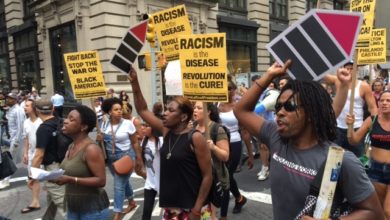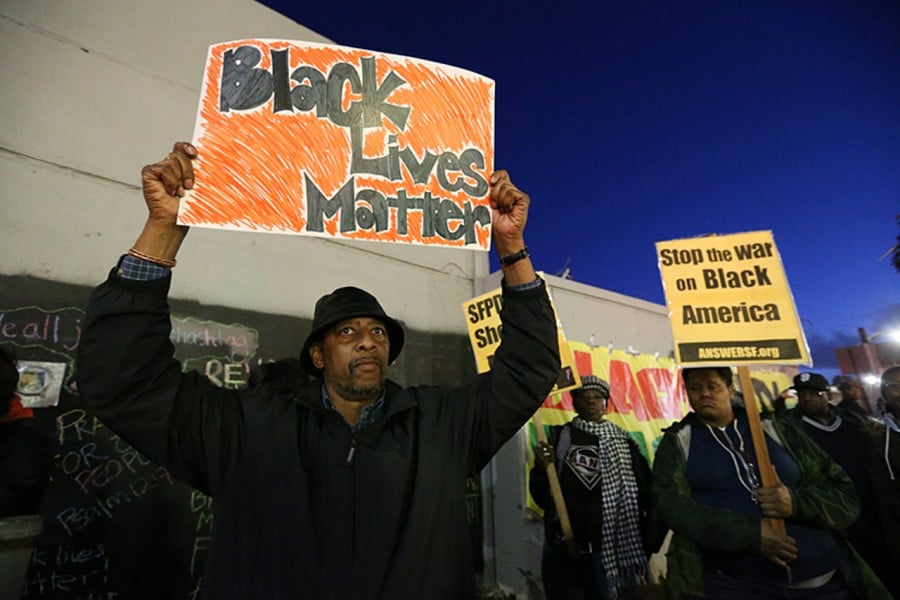“Resistance is a natural response to oppression, and the story of people of African descent in the western hemisphere is one of rebellion and broken shackles.”
— Marshall ‘Eddie’ Conway
On February 13th, we lost a giant of the Black freedom struggle and the fight for social justice when former Baltimore Black Panther Party member and political prisoner Marshall “Eddie” Conway passed away in Long Beach, California. Conway lived a life filled with struggle, resistance, love, incessantly pursuing knowledge, continual self-transformation, service to Black, poor and working class communities he came from, and commitment to revolutionary change. Conway lived his life for the people.
Conway was born and raised in Baltimore and saw the brutal reality of racism and capitalism wreaking havoc on his community throughout his life. But he was no mere observer and did not just lament at the injustices he witnessed: he decided to fight back, and walk in the path of his African ancestors who dared to struggle for their humanity.
Before Conway joined the Black Panther Party he joined the U.S. army at the age of 18. While in the army he came to revolutionary consciousness, after seeing the rebellion of Black people in the wake of the murders of Malcolm X, Dr. Martin Luther King Jr, and so many others – as well as the utter failings of U.S. capitalist “democracy” that characterized the late 1960s and early 1970s. He refused to be deployed to Vietnam to fight for imperialism, and instead decided to take the fight directly to the U.S. ruling class by joining and becoming a leader in the Black Panther Party. In one interview he said:
“I wanted to see if I could come and help solve whatever problems it was in terms of the black community rebelling like it was, joined the NAACP, worked with CORE, tried to integrate the workplaces. During the process of that, I found out that there were serious problems in the community. Young children were going to school without food. There was no medical care. There was a number of things. The community was under attack by the police departments, etc. So I looked around and identified what I thought was the best organization to address that. It was the Black Panther Party, so I joined the Black Panther Party.”
In 1970 Conway was falsely convicted of killing a Baltimore police officer and injuring another in one of the many frame-ups that targeted leaders of this era. Conway was targeted by the FBI because he was a revolutionary and effective at organizing Black, poor and working class people for power and self-determination in Baltimore. He, like so many revolutionaries, was railroaded and unjustly incarcerated.
As a Panther, Conway understood the centrality of uniting the multinational working class to fight against their common enemy: imperialism. In his own words, while in the BPP, “we formed alliances with groups in other communities, the Native American community, the [American Indian Movement]. We formed alliances with the Latino community, the Brown Berets; with the Puerto Rican community, the Young Lords; the white community, the Patriot Party, White Panther Party, etc.”
Conway lived his life as a determined and steadfast warrior for the people and the people’s struggles. Even upon his incarceration he founded a prison chapter of the Black Panther Party and continued to organize and raise consciousness. He also played a leading role in the creation of several prisoner initiatives such as helping form the Maryland chapter of the United Prisoner’s Labor Union and American Friends Service Committee’s A Friend of a Friend program.
While in prison, Conway published his autobiography in 2011: “Marshall Law: The Life & Times of a Baltimore Black Panther” where he details his determination to resist the forces of white supremacist and capitalist oppression and exploitation everywhere, even behind bars. Recognizing the historical impulse and arch of the fight for Black liberation he wrote:
“From the very moment that the cell door slammed shut, I knew it would be my responsibility to resist just like my enslaved ancestors in Virginia must have resisted. At times, that resistance would become more important than my actual innocence, for it was this determination to resist white supremacy that led to my imprisonment in the first place. Just as slavery led to the creation of the Underground Railroad, prisons have necessitated the development of a similar system comprised of relationships and routes that help the prisoner escape the inhumanity of incarceration. I have managed to hold on to my humanity for four decades now only because of the support from my family and my community, because they help me to remember that I am human.”
In 2014 following a ruling from Maryland’s highest court which said that the state’s jury instructions were unconstitutional, he was released from prison and hit the ground running, going back into Baltimore to organize and educate against social injustice, not skipping a beat. He joined progressive news outlet The Real News Network and became an Executive Producer and the host of Rattling the Bars, his weekly video program. Following the murder of Freddie Gray and the Baltimore Uprising, he helped to create the Tubman House, which appropriated vacant property and land for community needs in the Sandtown-Winchester neighborhood where Gray was murdered.
Conway said that he “spent 12 years in prison before they made a determination that we had all been tried illegally in the state of Maryland according to the law, but it took another 32 years to actually win our release, or win my personal release.” He ended up being locked up for 44 years and spent 6 of those years in solitary confinement, but did not allow the repression of the racist capitalist state to break his spirit and will to resist.
As an organizer with the Jericho Movement to free all political prisoners, and the People’s Congress of Resistance, I had the pleasure of meeting Eddie Conway in Boston and DC respectively, as we came together to push the work forward of freeing our captured revolutionaries from America’s dungeons and win the battle for democracy in this country. His work has inspired me and an entire generation of radicals and revolutionaries to continue to resist and never let go of the determination to fight in the face of all odds. While Marshall ‘Eddie’ Conway may be gone, his spirit of struggle lives on in every one of us whose lives he has touched.
The Party for Socialism and Liberation sends our condolences to the family and loved ones of Marshall ‘Eddie’ Conway and salute his life of service, self-sacrifice, and struggle for the people.





